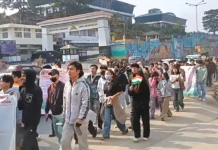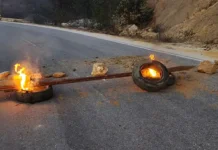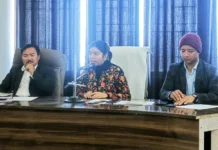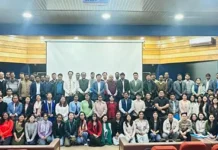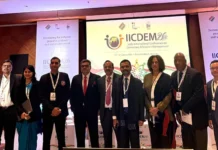[Nani Bath & Moti Taki]
The year 2023 gave Arunachal Pradesh three international highlights, having a common denominator – the communist China.
First, three Indian scientists – Mukesh Thakur, Lalit Kumar Sharma and Avijit Ghosh – were forced to withdraw a paper by the Wildlife Letters, an international peer-reviewed journal based in China. The journal’s objection was the mention of Arunachal as the sampling site where the white-cheeked macaque is located.
Secondly, three Wushu players got no clearance from China to participate in the recently held Asian Games in Hangzhou. Nyeman Wangsu was initially issued an accreditation card, but was blocked after two days. Onilu Tega and Mepung Lamgu could not download their accreditation cards. The same players, back in July 2023, had been issued ‘stapled visas’, which had led to the pulling out of the entire Indian Wushu team from the World University Games in Chengdu. Boje Marbom could not represent India in the Hangzhou Para Asian Games since the local organisers did not issue an accreditation card for his participation.
Third, the scheduled visit of FIFA president Gianni Infantino to grace the finals of the 2024 Santosh Trophy in Arunachal remains uncertain. There are reports indicating that the FIFA would not be associated with the national football championship for the Santosh Trophy this season because of “venue concern.”
China’s Arunachal fixation is something which is not easily discernible. On the question of issuing of visas to the residents of Arunachal, it does not follow a uniform policy. Initially, China did not grant visas to Indian citizens from Arunachal with the absurd reasoning that “people from Arunachal are citizens of China and hence do not require visas to travel there.” Following this policy, the then chief minister, Gegong Apang, was denied a visa, saying that he “being a Chinese” did not require a visa to visit his “own country.”
In 1981, the then speaker of the AP legislative assembly, TL Rajkumar, was denied a Chinese visa since he represented a “disputed territory.” Rajkumar was travelling to China as a member of the Indian parliamentary delegation to participate in an Asian conference of parliamentarians on population and development. However, with the intervention of the government of India and other member countries, he was granted a stapled visa.
Ganesh Koyu, who was serving as a secretary to the state government, was denied a visa in 2007. Being a resident of Arunachal, Koyu was considered a “Chinese national.”
The Weifang people’s government’s foreign and overseas Chinese affairs office invited 48 Indian members to the 8th China International Vegetable Sci-Tech Fair in 2007, including five officials from Arunachal (Pinhthika Namchoom, Tape Bagra, Tajom Taloh, Tasso Butung and Egam Basar). In the subsequent letter, however, the names of the state’s delegates were excluded.
In 2009, Riken Ngomle, a student at the National School of Drama in New Delhi, was allowed to visit Beijing on a stapled visa. In 2016, Goge Bam, another student from the National School of Drama, visited Beijing on a group visa. A student from the same school, Palin Kabak, was denied a visa in 2019.
Weightlifter Yukar Sibi and Abraham K Techi, an official of the Indian Weightlifting Federation, were granted stapled visas in January 2011. Since they did not have a regular visa issued by the Chinese embassy, the Indian immigration officers halted them before they could board a flight to China. The Chinese embassy in New Delhi once more provided stapled visas to the five members of the Indian karate team in July of the same year. They too were halted by immigration officials at New Delhi’s IGI airport.
It was in April 2011 that an entrepreneur, Tage Rita, was prevented from boarding the aircraft at the Kolkata airport. She was issued a stapled visa to travel to Kunming as a part of 53-person Tupperware corporate delegation on an “incentive trip” to China.
In 2012, China refused to grant visa to former Indian Air Force group captain Mohanto Panging. In the same year, a lady member of the Nehru Yuva Kendra Sangathan, Tilling Yamer, was denied a visa by Chinese authorities. She was a member of an Indian youth delegation, consisting of around 100 members, to participate in a 10-day youth exchange programme.
Mihu Maselo and Yumi Sorang, two young women archers from the state, were denied participation in the Youth World Archery Championship because of the stapled visa issue in 2013. Three years later, Bamang Tago, the manager of the Indian badminton contingent, could not travel to Fuzhou. The Chinese embassy in New Delhi remained silent on his visa application, and his passport was returned only after the event was over.
In October 2017, a conference on biodiversity at Kunming University was scheduled to be attended by Phupla Singpho, a state environmental activist. He had used a travel agency to apply for a visa at the Chinese embassy, but it was denied without a formal explanation.
There are also instances of issuing of stapled visas to the residents of the state who are not even indigenous to the state. Pemba Tamang, an Indian Army pistol shooter, who ordinarily resides in Arunachal, was issued a stapled visa. Likewise, a student, Sooraj Sharma, who hails from Delhi but was born in Aalo, West Siang district, too was issued a stapled visa. Both were stopped by the Indian immigration officials.
It is not that China only denied visas to the Indian citizens from Arunachal or issued stapled visas to them. There were occasions when indigenous residents from the state were granted stamped visas without any glitches. The 4th UN Conference on Women, held in Beijing, was attended by four ladies (Komoli Mossang, Jarjum Ete, Dipti Bengia and late Binny Yanga) in 1995 with regular visas.
A minister, Tsering Gurmey, was issued a visa to fly from Kolkata to Guangzhou in 2005. He was accompanied by his wife, Rinchin Drema. They were even permitted to visit Tibet, a place where no foreigner is allowed to travel without an additional permit called Tibet travel permit (Tibet visa). He was, however, denied a visa to visit Guangzhou again during 2011-’12.
In 2006, Vishal Pah Nabam was granted a Chinese visa, along with a student to visit Chanchun, the capital city of Jilin province of China. The student, Taba Konia, was pursuing a degree in medicine at Jilin University. Two years later, in 2008, BJP MP Kiren Rijiju, who was part of an official group of MPs to attend the Olympic Games in Beijing, was granted a visa.
Marpe Sora, teaching computer science at Rajiv Gandhi University, was granted a visa to visit Beijing, Shiangyang and Shanghai in 2007. While many have hailed the grant of regular visa to an Arunachal-born academician as a step towards “a possible prelude to China ultimately accepting Arunachal Pradesh as party of India as they did in case of Sikkim,” there are reports indicating that “Sora’s passport was issued in Guwahati and he had submitted an affidavit mentioning his address in the city.”
By March 2012, it was indicated that China had discontinued the policy of issuing stapled visas to residents of Jammu & Kashmir. There is, however, no change in China’s policy vis-? -vis Arunachal. Some Chinese scholars see the issue of a stapled visa as a ‘pragmatic’ step to allow people of Arunachal to visit China.
As China emerges as one of the global players in sports and other fields, most of the sporting events are expected to be held there. We surmise that, without a clear and bold stand on the issue of stapled visas from the government of India, the residents of Arunachal are the ones who will continue to be denied participation in many international events. The external affairs ministry had simply conveyed to China that “a uniform practice on issuance of visas to Indian nationals must be followed, regardless of the applicant’s ethnicity or place of domicile.”
China adheres to the strategy of “what is mine is mine, what is yours is negotiable” when dealing with sea and land disputes with more than two dozen countries. To counter China in any issue, be it stapled visa or territorial conflicts, India needs to demonstrate the ‘language of strength’, the language that China respects.
With or without political support, the Indian Army spoke the ‘language of strength’ during Nathula and Chola clashes in 1967, Sumdorong Chu Valley (1986), Dokhlam (2017) and Galwan (2020) stand-offs. The Chinese understood the ‘language’ and backed off.
Speaking the same language, Congress MP Shashi Tharoor twitted in X, “Enough is enough. Instead of frustrating our sportsmen & every other Arunachali seeking a Chinese visa, we should simply start issuing stapled visas ourselves, to anyone applying for an Indian visa from Tibet.”
Kiren Rijiju, the then-opposition BJP leader, and now earth sciences minister, calls it “a tragedy.” He said, “The government cannot convince China to issue normal visas to Arunachalis, nor does it allow us to travel on stapled visas. We are completely sandwiched.” He too was suggesting retaliatory action by granting stapled visas to citizens of the Tibet Autonomous Region, Xinxiang, Gansu, and Qinghay provinces.
If no retaliatory action can be contemplated, we may have to go for conciliatory gestures. For that, we may have to stop pricking China – what we call ‘local pricks’. The local pricks include inviting the Dalai Lama often to Arunachal. We have sources to suggest that courtesies are also extended to some officials from the central Tibetan administration visiting the state.
Secondly, our leaders need to be sensitive when commenting on diplomatic issues. One of the former chief ministers had stated that “India does not have boundary with China but with Tibet.” The same statement was repeated by the incumbent chief minister. Even in the signages of the Border Roads Organisation, Tibet, not China, is used. We need to remind ourselves that in 2003, India recognised the Tibet Autonomous Region as a part of China, while China recognised Sikkim as a part of Indian territory.
Our contention, therefore, is that, if the GoI is not poised to speak the language of Shashi Tharoor, Kiren Rijiju or Gen K Sunderji (CoAS in 1986), the residents of Arunachal may be allowed to travel to China on stapled visas, as was done on two earlier occasions.
A young lady, who was denied entry to China because of the stapled visa issue, said, “If the GoI is not suspicious of our trips to China, officials from the Intelligence Bureau would not have shadowed us.” The GoI and the Intelligence Bureau had launched a discreet inquiry about the purpose and intent of Tsering Gurmey’s visit to China. The union cabinet secretary wrote a letter to the Arunachal chief secretary, seeking information regarding his trip to China. We also contend that, if the present government applies similar approach in dealing with the stapled visa issue, it could well be counter-productive.
Niru Nanda, writing about the degree of integration of the Monpas with the Indian republic, states that the “Monpa need no further integration.” This applies equally to all tribal communities, across the geographical regions of the state.
Our hindsight thought is that, had India agreed to cede Aksai Chin in exchange for Indian ownership of the NEFA (now Arunachal Pradesh), the issue of stapled visa would not have cropped, crippling Arunachal residents’ participation in international events in China. Another: had India withdrawn the entire team from the Asian Games in protest and support of the three Wushu players, as had been done during the World University Games, there was a possibility of softening China’s position. India’s stand was clear and resolute when it concerned holding of G20 meetings in Arunachal. (Nani Bath is a faculty member in the political science department of Rajiv Gandhi University, Doimukh. Moti Taki is a research scholar in the same department.)

